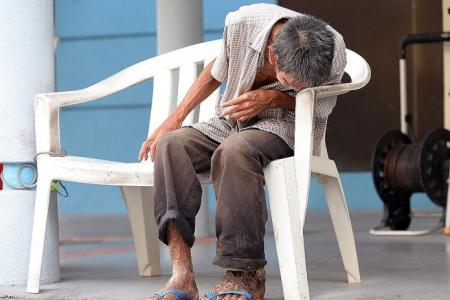Risking their lives. Why some people refuse treatment
Mr Lim is in need of medical attention and should have his decision-making capacity checked.
But he will not let medical professionals and social workers in.
His leg is in very bad shape and poses a risk to his life if left unchecked.
For the past year, social workers have been working tirelessly in convincing Mr Lim that he needs medical attention.
Self-preservation is the first law of nature. But how do you convince someone who no longer thinks so?
Can anyone compel him to go through treatment?
At the moment, no.
The Advance Medical Directive, which tells doctors not to apply life-sustaining treatment in the case of terminal illness, doesn't apply to him.
Medical professionals cannot decide if his seemingly irrational decision to not have his leg checked is because of diminished mental capacity.
To do that, they would have to see him and make an assessment. But he has refused that too.
Judging from what social workers have been telling me, Mr Lim is not the first and only person to reject life-saving treatment.
As our society ages, will there be more Mr Lims?
The Government is looking to amend the Mental Capacity Act. Public consultation ended last week.
Among the proposed changes is the ability for medical professionals to form a pool of donees or deputies to be appointed by the court to act on behalf of the mentally incapable.
But how would medical professionals and social workers decide on the mental capacity of someone like Mr Lim, who refuses to be assessed?
People can - and do - end up making irrational and illogical decisions.
The choice to not act on a life-threatening condition can be made under duress, during periods of high emotional or physical stress.
What if Mr Lim, who has no record of ever seeing a doctor, made his choice because he fears the unknown?
RATIONAL CHOICES
In Madam LP's case, doctors had no way of knowing and telling her before she slipped into a coma that she would die.
But she still told her son that she would rather die than have her legs amputated, which High Court Justice Choo Han Teck later said was not a clear and express refusal of treatment - she made that comment without knowing that she could die.
In essence, the courts are saying that rational choices can be made only after the patient has been informed.
But Madam LP woke up from her coma and refused to have her legs amputated. There was nothing the doctors could do.
Mr Lim may not be making a rational decision and may not have enough knowledge of his condition.
But at present, there is nothing to compel him to get medical help.
Only gentle persuasion.
Get The New Paper on your phone with the free TNP app. Download from the Apple App Store or Google Play Store now


